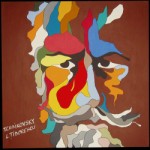 The eminent Russian composer Piotr Ilyich Tchaikovsky. Variant transliterations of his name include Tschaikovsky and Chaikovsky. Born in 1840, in a settlement adjacent to the Kama-Votkinsk Metal Works (managed by his father) in the Ural Mountains. The eminent Russian composer Piotr Ilyich Tchaikovsky. Variant transliterations of his name include Tschaikovsky and Chaikovsky. Born in 1840, in a settlement adjacent to the Kama-Votkinsk Metal Works (managed by his father) in the Ural Mountains.
The first mention of his involvement with music appears in a letter of 1844 that reports him as having helped compose a song, "Mama's in Petersburg". At home he heard folk songs, popular arias, and romances sung by his mother, and pieces played by a mechanical organ, among them excerpts from Mozart's "Don Giovanni" (Wolfgang Amadeus Mozart would remain Piotr Ilyich Tchaikovsky's most beloved composer).
Piano lessons, started about the age of five, continued in Saint Petersburg, where he entered boarding school in 1848.
From 1850 to 1859 he attended the School of Jurisprudence, where he assisted in a choir conducted by Gavriil Lomakin and studied piano with Rudolph Kundinger and harmony with Kundinger's brother.
Assigned on graduation to the Ministry of Justice, Piotr Ilyich Tchaikovsky continued to be drawn to music, and in 1861 he began classes sponsored by the "Russian Music Society".
The year after, he left his job and entered the just-founded Saint Petersburg Conservatory. Working zealously under Anton Rubinstein and Nikolai Zaremba, he received a Silver Medal for his graduation cantata on Johann Schiller's "An die Freude" in December 1865.
Piotr Ilyich Tchaikovsky taught theory in Moscow, joining the faculty of the new Moscow Conservatory when it opened in September 1866.
During his 11 years there, he composed his "Piano Concerto no. 1" (1875), the ballet "Swan Lake" (1876), four operas, three symphonies, and many smaller works.
He also established close ties with the composers of the nationalist group known as "The Five", especially Mily Balakirev and Nikolai Rimsky-Korsakov; the critic Vladimir Stasov called him the "sixth member of their circle".
His compositions sustained him throughout his continuous battle with his own nature.
In 1877 Piotr Ilyich Tchaikovsky made a disastrous marriage in order to defeat the torment of his homosexuality and to deny the spreading rumors of it.
His work was again his consolation when Nadezhda von Meck terminated her friendship and support without apparent reason.
Piotr Ilyich Tchaikovsky was opposed to the aims of the Russian nationalist composers and used Western European forms and idioms, although his work instinctively reflects the Russian temperament.
His orchestration is rich, and his music is melodious, intensely emotional, and often melancholyc.
From 1878 to 1885, Piotr Ilyich Tchaikovsky lived sometimes in Russia, sometimes in western Europe.
His reputation grew with the "Capriccio Italien" (1880), the 1812 "Overture" (1880), and two more operas, as well as the "Liturgy" (1878) and the "Vesper Service" (1881).
During his last years he lived in or near Moscow.
In 1888 Tsar Alexander III granted him a yearly pension.
Piotr Ilyich Tchaikovsky's fame, as both conductor and composer, spread as the result of a series of international tours, which brought him to the United States in 1891.
He continued to compose - the ballets "Sleeping Beauty" (1889) and "Nutcracker" (1892), "The Fifth" (1888), "Sixth" (1893), and "Manfred" (1885) Symphonies, and three final operas, including the powerful and theatrical "The Queen of Spades" (1890).
Younger composers emulated him, among them Mikhail Ippolitov-Ivanov and, later, Sergei Rachmaninoff.
On Nov. 6 (N. S.), 1893, a few days after conducting the premier of his Sixth Symphony, Piotr Ilyich Tchaikovsky died in Saint Petersburg.
Although it was reported that he died of cholera, some scholars now believe that his death was in fact a suicide, the result of a threat to reveal his liaison with a young Russian nobleman.
Piotr Ilyich Tchaikovsky's lyric gift owes much to Russian folk song, which he quotes ("First Piano Concerto", "Second" and "Fourth" Symphonies) or imitates ("First Symphony", "Second String Quartet"), and to the 19th-century Russian salon song, whose traits permeate his vocal melody (songs and romances, "Eugene Onegin") and even infuse his instrumental themes ("Fifth" and "Sixth" Symphonies).
The expressive pathos of his themes depends on abundant use of suspensions and anticipations, which also pervade his rich harmonies.
|